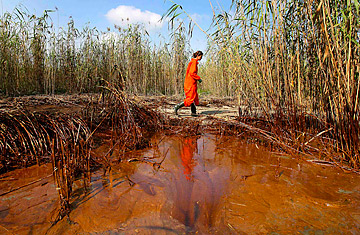
Lindsey Allen of Greenpeace walks through a patch of the oil spill at the mouth of the Mississippi River in Louisiana
Now that oil from the Deepwater Horizon rig has at last washed up on the Louisiana bayou, the race will be on to clean up as much of the mess as possible. But even if that effort goes well, the larger question is, Can the delicate marshes be saved?
The Delta's wetlands are one of the few barriers between New Orleans and the Gulf of Mexico as well as a rich estuary for the fish, shrimp and oysters that make up Louisiana's multibillion-dollar seafood industry. In recent decades, however, thousands of miles of the marsh have eroded, partly by acts of nature like storms and partly by the hands of man.
Almost daily since the oil rig exploded, throngs of boats have moved through the streams and bays of the prickly Delta, which is lined with bamboo-like Roseau cane and short grass, a stitching of vegetation that barely holds together the soil among some 70,000 miles of shore. The boats, often led by fishermen and shrimpers, have essentially one goal: searching for oil. On Tuesday, Louisiana Governor Bobby Jindal flew over the area in a helicopter with Billy Nungesser, president of Plaquemines parish, and found what appeared to be a vast stretch of brownish oil in an area of water called Pass a Loutre, in the southeastern tip of Louisiana's boot. Then, on Wednesday, the two men led a caravan of boats into the oil-infused water. Recent high tides had carried the oil across the marsh, where it could be seen standing about 3 inches onto cane stalks that are typically a foot tall. "I got sick to my stomach," Nungesser recalls.
When oil reaches sand beaches, it can basically be skimmed off. But sadly, not much can be done to remove it from the marsh. Merely stepping onto the marsh's soft surface will likely push the oil deeper into the water. Nature does have some weapons of its own: the marsh naturally contains bacteria that will degrade some of the oil, and Louisiana's humid climate may accelerate the process. Spraying fertilizer may also enhance the bacteria's growth. But Richard Steiner, a retired University of Alaska at Fairbanks marine-conservation professor, warns that much of the surrounding area will remain toxic. "The oil hits the cane stalk and just seeps straight down to the roots," he says. In the coming days, the cane and surrounding grass is expected to turn dark brown, and effectively die. Says Nungesser: "We'll never pick this oil out of the marsh. There's not a fish, turtle, not a bug, that will survive."
Federal and local officials have pushed BP, the petroleum giant responsible for cleaning up the spill, to implement various containment methods. One of the most common has been laying boom — basically, tubes intended to contain the oil so it can be skimmed or burned off the water's surface. Fishermen and shrimpers who've effectively lost their business have been hired to help in the effort. But so far, the booms have failed as tides have caused oil to lap over them and flow past. In some cases, the tubes punctured. That's why Jindal said yesterday, "This is only one tool in the toolbox."
One of Jindal's boldest moves has been to ask BP to spend nearly $350 million to pull sand from the sea and build a 6-ft.-high berm on the front side of the barrier islands in an attempt to keep oil-infused water from moving farther into the interior. Those barricades would take at least six months to complete, and there is no telling the damage the dredging could do to fragile bayou islands. So far, BP hasn't publicly indicated interest in the proposal, and the federal Army Corps of Engineers, which oversees the waterways, hasn't approved the process. Nungesser insists the project "will have an immediate effect on areas where the oil is close." But the truth is, experts say, the proposal is a long-term coastal restoration effort — and one that deserves serious consideration. "You don't want to do something rash and draconian," says Steiner. All this is being thrashed out at a moment when the beleaguered bayou may be facing yet another hit: even as the oil keeps gushing, the official start of hurricane season is just two weeks away.
